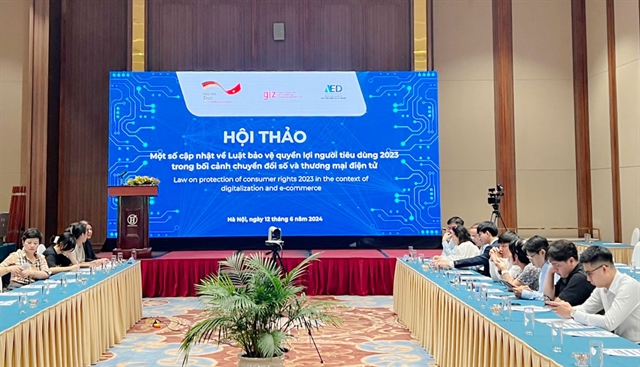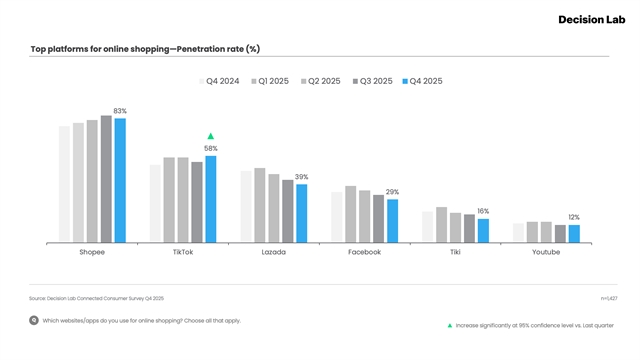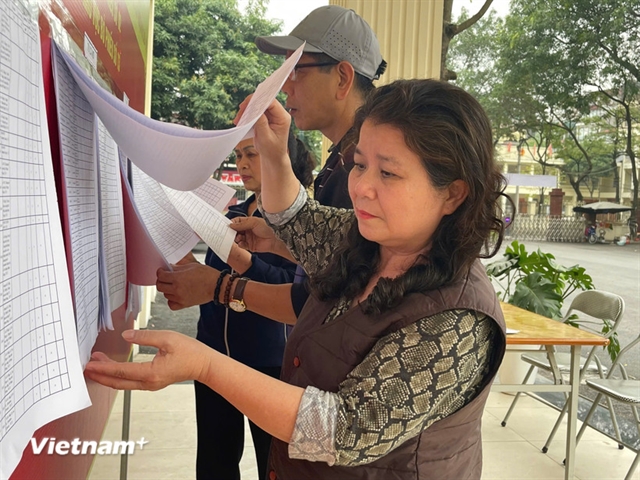 Economy
Economy

 |
| The workshop titled 'Laws on protection of consumer rights 2023 in the context of digitalisation and e-commerce'. — Photo chatluongvacuocsong.vn |
HÀ NỘI — Capturing and updating information and new regulations for business on risks in the e-commerce market place are extremely important, said Nguyễn Đức Trung, deputy director of the Agency for Enterprise Development (AED) under the Ministry of Planning and Investment (MPI).
The AED, with the German Corporation for International Cooperation (GIZ), organised an information support workshop for businesses titled 'Laws on protection of consumer rights 2023 in the context of digitalisation and e-commerce' to help them navigate the new e-commerce waters.
The workshop was aimed at helping businesses understand risks within the new market and find out about new regulations on protecting consumer rights.
The MPI has built a business information portal about the digital ecosystem to support companies. It focuses on helping them understand new global trends such as responsible business, digital transformation, fourth generation technology applications, as well as connecting businesses.
There is also a way to connect with a network of professional consultants.
Phạm Quế Anh, a GIZ expert, outlined the opportunities and challenges for consumers when participating in e-commerce platforms operating across borders.
"The challenge facing them today is the difficulty in identifying both the buyers and sellers, keeping their details private and keeping trading secure," Quế Anh said.
E-commerce develops rapidly, creating opportunities for consumers so there are more choices, including better goods and products and more competitive prices as the boundaries of the market are expanded.
However, in the context of digital transformation and cross-border e-commerce, transactions take place on the Internet, on the seller's website or on a third-party platform.
Consumers are not allowed to check the quality of goods so they have to rely on collecting information from previous research, or reviews from other buyers.
That can be risky, as are the payment systems, often through a third party, or payment on delivery.
Director of GIZ ASEAN SME Project Sita Zimpel emphasised that currently, many international commitments have been built to promote the protection of consumer rights in the context of digital transformation and e-commerce.
In the region, the ASEAN Strategic Action Plan on Consumer Protection for the 2016-25 period has been approved by member states and last year ASEAN also launched a set of guidelines for protecting consumers while involved in e-commerce.
She said these efforts were important in changing perceptions about consumer protection, aiming to harmonise legal regulations among countries in the region, thereby promoting sustainable trade.
To harmonise with international commitments and resolve new issues arising in the context of a strong digital transformation, Deputy Head, Consumer Protection Division, National Competition Commission Hồ Tùng Bách said that the Law on Consumer Rights Protection was passed by the Vietnamese National Assembly last year and would officially take effect from July 1 this year.
Specifically, the 2023 Law on Consumer Rights Protection expands the scope of foreign businesses providing products and services to consumers in Việt Nam.
In addition, the law has many new regulations related to the protection of consumer information, vulnerable consumers, provision of digital platform services and responsibility for providing product recall. — VNS




